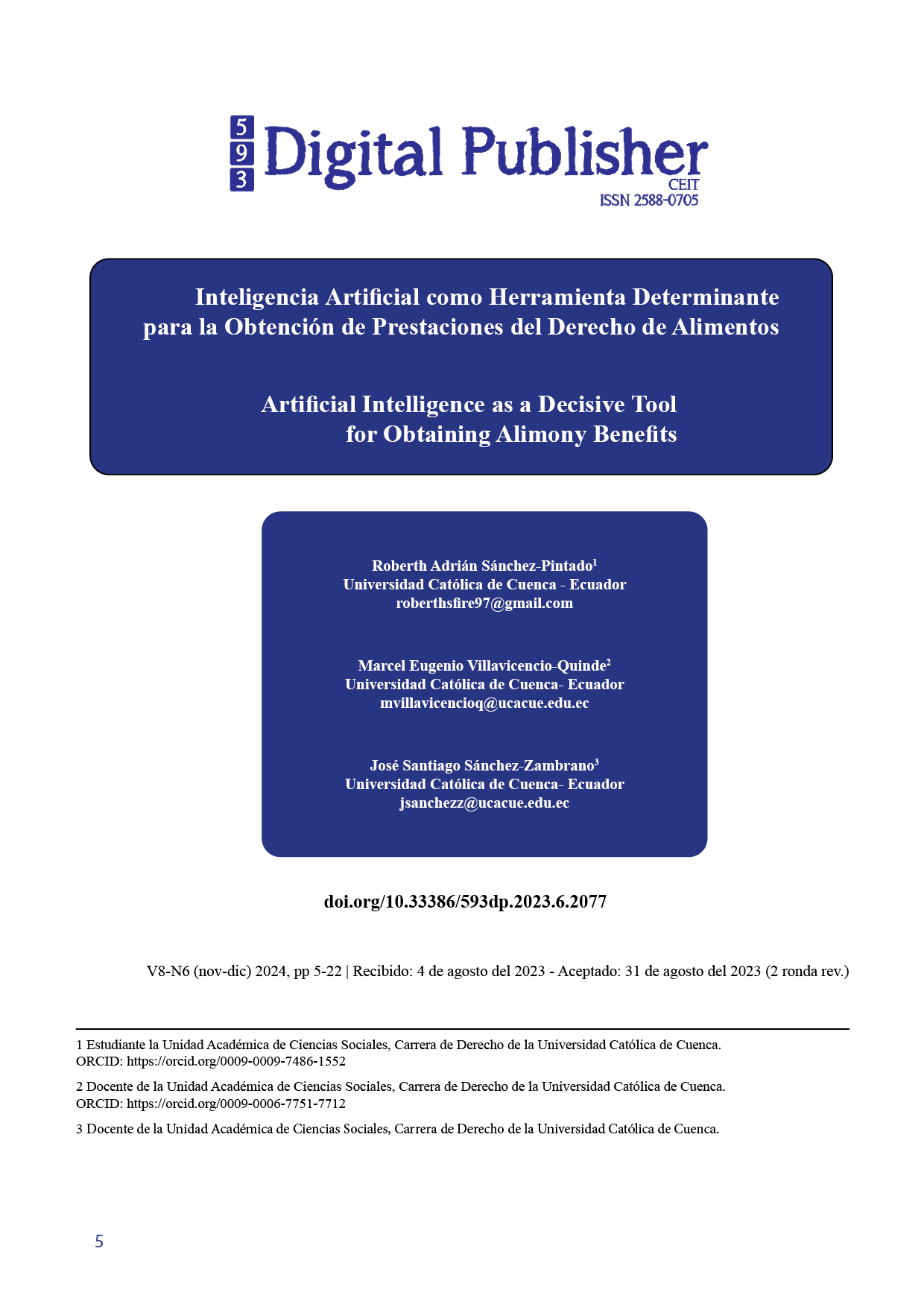Artificial Intelligence as a Decisive Tool for Obtaining Alimony Benefits
Main Article Content
Abstract
The objective of the present research work is to establish procedural innovations based on Artificial Intelligence (AI) in the Ecuadorian jurisdiction, in order to fulfill the constitutional principle of procedural expeditiousness. To achieve this, this research begins with a historical mention of legaltech and basic notions about AI, in order to understand the evolution of technology in the service of law. Later on, intelligent systems developed and used by other countries in the field of justice or other legal domains will be analyzed, which will allow for evaluating their scope of application and effectiveness, with the aim of considering the replication or improvement of this technology according to the national judicial system. Finally, some legal-technological reflections are made based on procedural regulations and the capabilities of ICTs, in order to propose the use of autonomous assistive systems as a procedural innovation in obtaining rights to alimony, thus forging a new reality of effectiveness and efficiency within the Ecuadorian administration of justice.
Downloads
Article Details

This work is licensed under a Creative Commons Attribution-NonCommercial-ShareAlike 4.0 International License.
1. Derechos de autor
Las obras que se publican en 593 Digital Publisher CEIT están sujetas a los siguientes términos:
1.1. 593 Digital Publisher CEIT, conserva los derechos patrimoniales (copyright) de las obras publicadas, favorece y permite la reutilización de las mismas bajo la licencia Licencia Creative Commons 4.0 de Reconocimiento-NoComercial-CompartirIgual 4.0, por lo cual se pueden copiar, usar, difundir, transmitir y exponer públicamente, siempre que:
1.1.a. Se cite la autoría y fuente original de su publicación (revista, editorial, URL).
1.1.b. No se usen para fines comerciales u onerosos.
1.1.c. Se mencione la existencia y especificaciones de esta licencia de uso.
References
Aguerre, C., Amunátegui, C., Aranguis, M., Bustos Frati, G., Castaño, D., Mendoza Enriquez, O. A., Moreno González, J., Gorgone, B., Lens, J., Madrid, R., Maqueo Ramírez, M. S., Rentería Marín, C., Segredo, S., & Vargas, F. (2021). Preparación del sector judicial para la inteligencia artificial en América Latina. http://repositorio.udesa.edu.ar/jspui/handle/10908/18634
Asamblea Nacional. (2003). Código de la Niñez y Adolescencia. FielWeb - Evolución Jurídica.
Asamblea Nacional. (2008). Constitución de la República del Ecuador. FielWeb - Evolución Jurídica.
Asamblea Nacional. (2015). Código Orgánico General de Procesos. FielWeb - Evolución Jurídica.
Ast, F. (2022, enero 24). Los Pioneros del Legaltech. Astec. https://medium.com/astec/los-pioneros-del-legaltech-6a2d22f67f43
Bautista, N. P. (2022). Proceso de la investigación cualitativa: Epistemología, metodología y aplicaciones. Editorial El Manual Moderno.
Belmonte Ruipérez, J. A. (2022). El sesgo en el uso del big data aplicado a la seguridad y defensa para la predicción de la comisión de delitos. http://dspace.umh.es/handle/11000/28786
Borja, M. E., & Pérez, M. M. (2019). Big data: Un análisis documental de su uso y aplicación en el contexto de la era digital. Revista La Propiedad Inmaterial, 28, Article 28. https://doi.org/10.18601/16571959.n28.10
Cáceres, A. M. (2021). El impacto de la inteligencia artificial en el Derecho. Advocatus, 039, Article 039. https://doi.org/10.26439/advocatus2021.n39.5117
Colmenares, M. F. C., Cortez, N. E. S., & Suárez, L. M. O. (2021). Valoración de la inserción de la inteligencia artificial en el ámbito jurídico: Un análisis frente al proceso del ente acusador en etapa de indagación. Via Inveniendi Et Iudicandi, 16(2), 1-35.
Dirección Nacional de Estudios Jurimétricos y Estadística Judicial. (2022). Informe Estadístico Jurisdiccional Anual (Enero—Diciembre, 2022). https://www.funcionjudicial.gob.ec/www/pdf/INFORME_ESTADISTICO_JURISDICCIONAL_ANUAL_2022.pdf
Elisavetsky, A. (2020). La mediación a la luz de las nuevas tecnologías: Un recorrido multigeográfico por los orígenes y presente del desarrollo de la resolución de conflictos y el impacto tecnológico. Errepar.
Estevez, E. C., Linares, S., & Fillottrani, P. (2020). Prometea: Transformando la administración de justicia con herramientas de inteligencia artificial. Banco Interamericano de Desarrollo. https://doi.org/10.18235/0002378
García Tudela, L. (2022). El Deep Learning: Perspectiva general y su aplicación en el campo del Healthcare. https://repositorio.comillas.edu/xmlui/handle/11531/57044
Guglieri Lillo, A. O., & Fernández Comas, J. M. (2020). Información y análisis de software, productos y herramientas para el sector legal. Guía Legaltech 2020. Editorial Reus. https://doi.org/10.30462/9788429022940
Gutiérrez, J. D. (2020). Retos éticos de la inteligencia artificial en el proceso judicial (Ethical Risks of Using Artificial Intelligence Systems for Judicial Decision-Making Processes) (SSRN Scholarly Paper 4011179). https://doi.org/10.2139/ssrn.4011179
Harper, C. M., & Zhang, S. S. (2021). Legal Tech and Lawtech: Towards a Framework for Technological Trends in the Legal Services Industry. En H. Gimpel, J. Krämer, D. Neumann, J. Pfeiffer, S. Seifert, T. Teubner, D. J. Veit, & A. Weidlich (Eds.), Market Engineering: Insights from Two Decades of Research on Markets and Information (pp. 183-197). Springer International Publishing. https://doi.org/10.1007/978-3-030-66661-3_11
Jarama Castillo, Z. V., Vásquez Chávez, J. E., Durán Ocampo, A. R., Jarama Castillo, Z. V., Vásquez Chávez, J. E., & Durán Ocampo, A. R. (2019). El principio de celeridad en el código orgánico general de procesos, consecuencias en la audiencia. Revista Universidad y Sociedad, 11(1), 314-323.
Jiménez, E. C. (2021). Introducción al Machine Learning con MATLAB. Marcombo.
López Echeverría, F. V. (2021). Legal Tech: El Derecho y la Innovación tecnológica. https://repositorio.ulacit.ac.cr/handle/123456789/10578
Lozada Moreno, W. A., & Martinez Mendoza, H. F. (2018). Apoyo en la toma de decisiones en los procesos de fijación de cuota alimentaria, soportado en tecnologías Cognitivas. https://repositorio.escuelaing.edu.co/handle/001/941
Martinez Martinez, J. A., & Boyacá Manrique, C. F. (2022). La humanización del procedimiento jurídico por medio de la tecnología: Revisión documental: Caso de estudio Pretoria. http://repository.unilibre.edu.co/handle/10901/23543
Mut, M. B. A. (2021). La mediación civil: Estudio comparado y referencia a las nuevas tecnologías para su desarrollo. Aranzadi / Civitas.
Nieto, E. C. (2023). LA INTELIGENCIA ARTIFICIAL APLICADA AL DERECHO COMO UNA NUEVA RAMA DE LA TEORÍA JURÍDICA. Anales de la Cátedra Francisco Suárez, 57, 63-89.
Nogueras, A. (2023, enero 16). Qué es el Legaltech y por qué es importante adaptarse a esta tendencia. EALDE Business School. https://www.ealde.es/legaltech/
Oracle. (2023). ¿Qué es una base de datos? https://www.oracle.com/mx/database/what-is-database/
Parra Diaz, C. R. (2016). Análisis Jurídico del Derecho de Alimentos en los menores de edad y su aplicación en las Unidades Judiciales de la Familia, Mujer, Niñez y Adolescencia del Cantón Quito. [BachelorThesis, Quito: UCE]. http://www.dspace.uce.edu.ec/handle/25000/6475
Quiroz, Á. R. A. (2023). Metodología para redactar un proyecto de investigación en la ciencia del derecho. Revista Científica FIPCAEC (Fomento de la investigación y publicación científico-técnica multidisciplinaria). ISSN : 2588-090X . Polo de Capacitación, Investigación y Publicación (POCAIP), 8(2), 461-476.
Rouhiainen, L. (2018). Inteligencia Artificial. 101 cosas que debes saber hoy sobre nuestro futuro. Alienta Editorial. https://static0planetadelibroscom.cdnstatics.com/libros_contenido_extra/40/39308_Inteligencia_artificial.pdf
Rúa, M. M. B., Muñoz, S. Á., Aristizábal, J. A. G., & Tapiero, J. I. M. (2020). Solución de Controversias en Línea, Mecanismos Alternativos de Solución de Conflictos e Inteligencia Artificial para la descongestión en la administración de justicia. Law, State and Telecommunications Review, 12(1), Article 1. https://doi.org/10.26512/lstr.v12i1.25808
Salmerón-Manzano, E. (2021). Legaltech and Lawtech: Global Perspectives, Challenges, and Opportunities. Laws, 10(2), Article 2. https://doi.org/10.3390/laws10020024
Sierra, Y. (2023, febrero 15). Tecnologías legaltech: Qué son y cómo funcionan. Legaltech. https://blog.lemontech.com/legaltech/
Suarez Manrique, W. Y., & De León Vargas, G. I. (2019). Inteligencia artificial y su aplicación en la administración de justicia. Revista Jurídica Mario Alario D´Filippo, 11(21). https://doi.org/10.32997/2256-2796-vol.11-num.21-2019-2501
Surden, H. (2019). Artificial Intelligence and Law: An Overview (SSRN Scholarly Paper 3411869). https://papers.ssrn.com/abstract=3411869
Uscamayta Huamán, G. E. (2021). Inteligencia artificial como herramienta para mejorar la calidad y celeridad de decisiones jurisdiccionales. http://repositorio.uandina.edu.pe/handle/20.500.12557/4259
Webley, L., Flood, J., Webb, J., Bartlett, F., Galloway, K., & Tranter, K. (2019). The Profession(s)’ Engagements with LawTech: Narratives and Archetypes of Future Law. Law, Technology and Humans, 1, 6.




